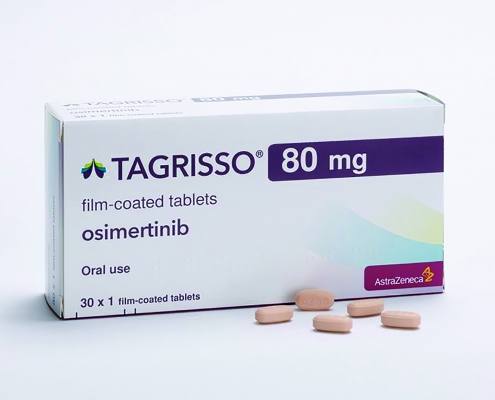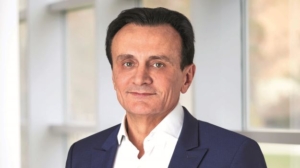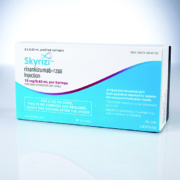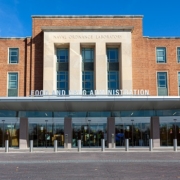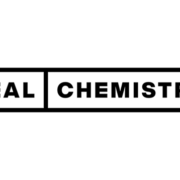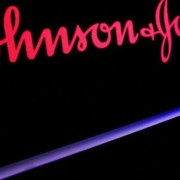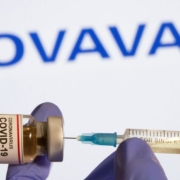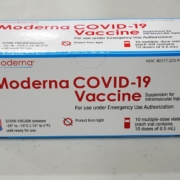AstraZeneca 2022: Alexion, cancer, COVID
Alexion has boosted AstraZeneca’s rare disease expertise while the company has experienced success in oncology and COVID-19.
By Christiane Truelove • [email protected]
1 Francis Crick Avenue
Cambridge Biomedical Campus
Cambridge CB2 0AA, UK
++44 (0)20 3749 5000 • astrazeneca.com
| Financial Performance | ||||
| 2021 | 2020 | 1H 2022 | 1H 2021 | |
| Revenue | $37,417 | $26,617 | $22,161 | $15,540 |
| Net income | $115 | $3,144 | $748 | $2,112 |
| Diluted EPS | $0.08 | $2.44 | $0.48 | $1.61 |
| R&D expense | $9,736 | $5,991 | $4,679 | $3,542 |
| All figures are in millions of dollars, except EPS. | ||||
Best-selling products
All sales are in millions of dollars.
2021 sales
- Tagrisso $5,015
- Vaxzevria $3,917
- Farxiga $3,000
- Symbicort $2,728
- Imfinzi $2,412
- Lynparza $2,348
- Soliris $1,874
- Brilinta $1,472
- Nexium $1,326
- Fasenra $1,258
- Calquence $1,238
- Crestor $1,096
- Pulmicort $962
- Toprol-XL/Seloken $951
- Zoladex $948
- Ultomiris $688
1H 2022 sales
- Tagrisso $2,704
- Soliris $2,017
- Farxiga $2,103
- Vaxzevria $1,540
- Imfinzi $1,294
- Lynparza $1,291
- Symbicort $1,288
- Evusheld $914
- Calquence $903
- Ultomiris $853
- Brilinta $675
- Nexium $674
- Fasenra $662
- Crestor $547
- Zoladex $477
- Toprol-XL/Seloken $467
- Strensiq $450
- Pulmicort $334
- Synagis $280
Outcomes Creativity Index Score: 72
- Manny Awards — 9
- Cannes Lions — 2
- Clio Health — 16
- Creative Floor Awards — 21
- London International Awards – 15
- MM+M Awards — 6
- One Show — 3
“In 2021, despite the ongoing challenge of the COVID-19 pandemic, AstraZeneca continued to advance delivery of our strategy – supplying our medicines to patients, as well as launching new ones and expanding into new indications,” says Pascal Soriot, CEO of AstraZeneca.
The company’s strategy was boosted with the completion of the acquisition of Alexion Pharmaceuticals during July 2021. “With [Alexion’s] expertise in rare diseases, not only is our science base and drive for growth strengthened, but also, more importantly, our ability to make a difference to patients around the world,” Soriot says.
According to Soriot, with rare diseases representing a significant unmet medical need, Alexion’s innovative complement-biology platform and robust pipeline will continue to pioneer the discovery and development of medicines for these often devastating conditions.
“It represents a high-growth opportunity and we are already starting to see the delivery of this potential with Ultomiris and the other medicines in the Alexion portfolio, supported by developments such as the acquisition of Caelum Biosciences and their potentially first-in-class mAb for the treatment of amyloid light-chain (AL) amyloidosis,” Soriot states.
As a result of the acquisition, Alexion’s Aradhana Sarin became AstraZeneca’s chief financial officer and joined that company’s board. Additionally, AstraZeneca’s Marc Dunoyer stepped down from the board to become CEO of Alexion, and chief strategy officer at AstraZeneca.
In April the company announced plans for a new strategic R&D center and Alexion headquarters in Cambridge, Mass. The 570,000-square-foot site will bring together about 1,500 R&D, commercial, and corporate colleagues into a single purpose-built space in Kendall Square. Company executives expect the site, which will have room for expansion, to be completed in 2026.
“Kendall Square, Cambridge, is at the heart of the life sciences and innovation hub of the greater Boston area, and our new site will put us right at the center of this space,” Soriot says. “The move will provide access to some of the most innovative partners in academia and biotech, offering opportunities to accelerate our growth and collaborate with like-minded organizations as we continue to push the boundaries of science to deliver advances for patients.”
Chairman Leif Johansson calls 2021 a “landmark” year for the company as it continued on a strong growth trajectory.
“The positive news from our pipeline, including FDA emergency use authorization of Evusheld and the approval of Tezspire, support the outlook for 2022,” he says.
Johansson himself will be stepping down from the board as chairman, with the company announcing in July that Michel Demaré is now the chair-
designate. Johansson will officially retire at the end of the company’s general meeting in April 2023.
“I could not be prouder to be named chair-designate of the board of AstraZeneca and am excited to have the opportunity to build on Leif’s success as chair and work with Pascal and members of the board and senior executive team when I take on my new role in 2023,” Demaré says.
Performance & Outlook
Soriot noted that AstraZeneca’s efforts continued to deliver for shareholders in 2021. Total revenue grew 41 percent, or 38 percent at constant exchange rates to $37.42 billion. “We saw double‑digit growth in all major regions, including Emerging Markets, despite some headwinds in China.”
The company’s net income was $115 million in 2021, 96 percent less than in 2020. Earnings per share were 8 cents compared with $2.44 in 2021. Management attributed this drop to additional costs in the wake of the Alexion acquisition, including increased intangible asset impairments and restructuring charges, of which $1 billion relates to the Post Alexion Acquisition Group Review, aimed at integrating systems, structure and operations to optimize the global footprint and prioritize resource allocations and investments.
For the first half of 2022, revenue was $22.16 billion, 43 percent more than in first-half 2021. Earnings were 48 cents compared with $1.61 in the same period last year.
“AstraZeneca had a strong financial first half of 2022, and great pipeline delivery. We announced practice-changing data for several medicines including Enhertu in breast cancer, Farxiga in heart failure, and Ultomiris in neuromyelitis optica spectrum disorder,” Soriot says. “Given the ongoing performance of our underlying business and the contribution of our COVID-19 medicines, we are updating our revenue guidance for 2022. This has enabled us to increase our R&D investment in the exciting number of pipeline opportunities that can benefit patients and drive long-term sustainable growth for our company.”
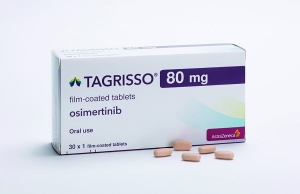
Sales for the lung cancer medicine Tagrisso increased 16 percent in 2021, and grew by 10 percent in the first half of 2022.
The oncology drug Tagrisso was AstraZeneca’s best-selling product in 2021. Tagrisso, approved in 71 markets as an adjuvant treatment for early-stage EGFR-mutated non-small cell lung cancer (NSCLC), including in the European Union and China, generated $5.02 billion, an increase of 16 percent.
Tagrisso sales in the first half of 2022 were $2.7 billion, 10 percent more than in the same period last year. Worldwide, sales were driven by increased use of Tagrisso in adjuvant and first-line settings. However, China’s COVID-19 related lockdowns in several major cities had an adverse impact on sales.
Although not approved in the United States, AstraZeneca’s COVID-19 vaccine Vaxzevria generated $3.92 billion in 2021, its first year of sales. In the first half of 2022, sales of the vaccine were $1.54 billion compared with $1.17 billion in the same period last year. Company executives say the majority of Vaxzevria revenue in first-half 2022 came from initial, not-for-profit contracts. However, in May 2022, Vaxzevria was granted EMA approval for use in the EU as a third-dose booster in adults.
AstraZeneca’s diabetes drug Farxiga produced 2021 sales of $3 billion, compared with $1.96 billion in 2020. Company executives say Farxiga was the primary growth driver in the company’s cardiovascular, renal and metabolism area in 2021, with chronic kidney disease added to the drug’s label. First-half 2022 sales were $2.1 billion compared with $1.36 billion one year earlier, making Farxiga one of the growth driver’s in AstraZeneca’s BioPharmaceuticals area.
The company’s asthma drug Symbicort posted $2.73 billion in 2021, about the same as in 2020. While sales grew in the United States by 4 percent, this was offset by declines in Europe and Japan. Sales in the first half of 2022 declined to $1.29 billion from $1.37 billion, affected by the impact of newer fixed-dose triple therapies and the encroachment of generics.
Imfinzi was the fifth top seller for AstraZeneca in 2021. The lung cancer drug generated $2.41 billion, an increase of 18 percent spurred by regulatory approvals and launches in China and continued growth in other markets. First-half 2022 sales were $1.29 billion, 12 percent more than in the same period in 2021.
Lynparza’s sales of $2.35 billion, compared with $1.78 billion in 2020, put the oncology drug at No. 6 for AstraZeneca in 2021. Sales in the first half of this year were also higher than in the same period of 2021, at $1.29 billion compared with $1.13 billion.
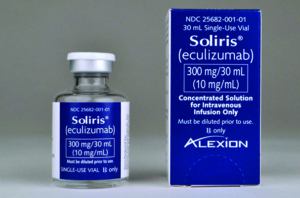
Soliris, which came via the Alexion acquisition, generated sales of $1.87 billion in 2021 for AstraZeneca.
Soliris generated 2021 sales of $1.87 billion for AstraZeneca after being acquired with Alexion in July of last year. The drug treats paroxysmal nocturnal hemoglobinuria (PNH) and atypical hemolytic uremic syndrome (aHUS). Sales in first-half 2022 were $2.02 billion, 5 percent less than in same-time 2021 due to the decline to substitution with Ultomiris.
The cardiovascular product Brilinta recorded 2021 sales of $1.47 billion, 8 percent less than in 2020. The dip was attributed to generic erosion and pricing pressures. First-half 2022 sales continued to decline to $675 million, 10 percent less than in first-half 2021.
Another established drug for AstraZeneca, the proton-pump inhibitor Nexium, was the ninth best-selling drug for the company in 2021, at $1.33 billion, 11 percent less than in 2020. Sales in first-half 2022 were $674 million compared with $739 million in the same period last year.
AstraZeneca’s 10th best-
selling drug in 2021 was the asthma drug Fasenra, which generated $1.26 billion compared with $949 million in 2020. Sales in the first half of this year were $662 million, 14 percent more than in first-half 2021.
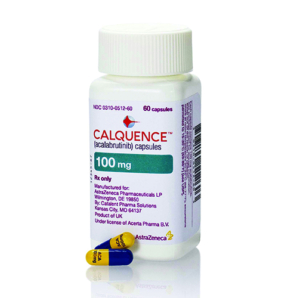
The chronic lymphocytic leukemia drug Calquence generated 2021 sales of $1.24 billion compared with $522 million in 2020.
The chronic lymphocytic leukemia drug Calquence generated 2021 sales of $1.24 billion compared with $522 million in 2020. Management says the next-generation Bruton’s tyrosine kinase inhibitor (BTKi) is now the therapy of choice for more than 40 percent of U.S. patients initiating a BTKi treatment in first-line CLL. Growth continued in the first half of 2022 with sales of $903 million compared with $490 million in the same period last year.
The cholesterol drug Crestor posted 2021 sales of $1.1 billion compared with $1.18 billion in 2020. Sales increased slightly in the first half of this year, at $547 million versus $539 million in first-half 2021, driven by growth in emerging markets.
Another longtime product, the COPD and asthma drug Pulmicort, generated $962 million during 2022, 3.4 percent less than in 2020. First-half 2022 sales continued to decline, dipping to $334 million compared with $497 million in the first half of 2021.
Legacy hypertension, heart failure, and angina product Toprol-XL/Seloken did well in 2021 sales with $951 million compared with $821 million the previous year. Sales in the first half of 2022 were $467 million, 9 percent less than in the same period last year.
The prostate and breast cancer drug Zoladex generated 2021 sales of $948 million, versus $888 million in 2020. First-half 2022 sales were $477 million compared with $466 million in same-period 2021.
Ultomiris, another drug that came with the July 2021 acquisition of Alexion, produced $688 million in sales during last year for AstraZeneca. Sales of the treatment for PNH and aHUS continued to grow in 2022, reaching $853 million in the first six months of this year.
Success with Evusheld
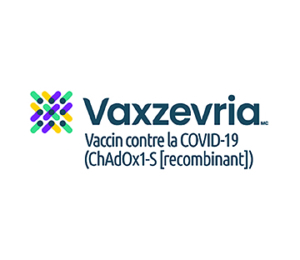
Vaxzevria, which was jointly invented by the University of Oxford, generated $3.92 billion for AstraZeneca in 2021.
Although AstraZeneca has not been able to get U.S. approval for Vaxzevria, the company’s Evusheld (tixagevimab co-packaged with cilgavimab), a long-acting antibody (LAAB) combination against the COVID-19 virus, is the first antibody therapy to have shown a high level of protection against symptomatic COVID-19 in a pre-exposure prevention setting.
Evusheld received Emergency Use Authorization from the FDA in December 2021 for the pre-exposure prophylaxis (prevention) of COVID-19 in people with moderate-to-severe immune compromise due to a medical condition or immunosuppressive medications and who may not mount an adequate immune response to COVID-19 vaccination, as well as those individuals for whom COVID-19 vaccination is not recommended.
In 2021, AstraZeneca agreed to supply the U.S. government with 700,000 Evusheld doses, and in January 2022 the government announced that it had agreed to purchase 500,000 additional doses.
Evusheld is also authorized for emergency use for prevention of COVID-19 in several other countries, including France.
Contracts pushed the sales of Evusheld to $914 million in the first half of 2022. The company has received contracts to provide doses in Central and Eastern Europe, Latin America, and South East Asia and China. Evusheld is now the first non-Chinese medicine to be used for the prevention of COVID-19 in China. The drug was approved in the EU for prevention of COVID-19 in March.
In June 2022, AstraZeneca announced results from the TACKLE Phase III outpatient treatment trial, which demonstrated that Evusheld provided clinically and statistically significant protection against progression to severe COVID-19 or death from any cause compared to placebo, with treatment with Evusheld earlier in the disease course leading to more favorable outcomes. The data have been published in The Lancet Respiratory Medicine.
“These results published in The Lancet Respiratory Medicine add to the growing evidence supporting the use of Evusheld to help patients who most need additional protection against COVID-19,” states Mene Pangalos, executive VP, BioPharmaceuticals R&D. “We are discussing the TACKLE data with regulatory authorities and continue to progress submissions in both treatment and prophylaxis indications to help combat COVID-19 on all fronts.”
In September 2022, Evusheld was approved in the European Union for the treatment of adults and adolescents (aged 12 years and older weighing at least 40 kg) with COVID‑19 who do not require supplemental oxygen and who are at increased risk of progressing to severe COVID‑19.
The European Commission’s approval was based on results from the TACKLE Phase III COVID-19 treatment trial which showed one intramuscular (IM) dose of Evusheld provided clinically and statistically significant protection against progression to severe COVID-19 or death from any cause compared to placebo. Evusheld treatment earlier in the disease course led to more favorable outcomes.
AstraZeneca said the recommended dose of Evusheld for treatment in Europe is 300mg of tixagevimab and 300mg of cilgavimab, administered as two separate, sequential IM injections.
Iskra Reic, executive vice president of vaccines and immune therapies at AstraZeneca, stated, “COVID-19 remains an ongoing health concern for millions of Europeans and around the world, especially for those who may not be well-protected against the virus from vaccination. With this approval, Evusheld is now the only long-acting antibody combination available for both prevention and treatment of COVID-19 in Europe, allowing us to protect even more people from this devastating disease.”
Another acquisition, more partnerships
AstraZeneca has continued its strategy of strategic acquisitions and partnerships in 2022. In July, AstraZeneca announced the acquisition of TeneoTwo Inc., including its Phase I clinical-stage CD19/CD3 T-cell engager, TNB-486, currently under evaluation in relapsed and refractory B-cell non-Hodgkin lymphoma. The deal was completed in August. AstraZeneca will develop TNB-486 as a potential new medicine for B-cell hematologic malignancies.
According to Anas Younes, senior VP, hematology R&D, AstraZeneca, “By redirecting the body’s natural immune response to target B-cell malignancies, TNB-486 alone or in combination with CD20-targeted therapy could potentially deepen clinical responses and improve patient outcomes. We believe this innovative molecule, which was designed to optimize the therapeutic window of T-cell activation, will enable us to explore novel combinations that have the potential to become new standards of care in this setting.”
AstraZeneca in May entered into a license agreement with RQ Biotechnology Ltd. for a portfolio of early-stage monoclonal antibodies (mAbs) targeted against SARS-CoV-2. RQ Bio is a UK-based biotechnology company focused on developing treatments and preventative therapies based on potent broad-spectrum mAbs to address areas of unmet need in vulnerable patient populations.
Under the agreement, AstraZeneca acquired an exclusive worldwide license to develop, manufacture, and commercialize mAbs against SARS-CoV-2.
“The COVID-19 pandemic has changed the landscape for immune therapies, including the use of monoclonal antibodies to protect vulnerable patients who can’t respond adequately to vaccination alone,” Reic says. “Scientific innovation is rapidly accelerating, and this agreement reflects our continued commitment to the discovery and development of new medicines to help prevent and treat infectious disease, including COVID-19.”
In March 2022, AstraZeneca’s Rare Disease group Alexion closed an exclusive global collaboration and license agreement with Neurimmune AG for NI006, an investigational human monoclonal antibody in Phase Ib development for the treatment of transthyretin amyloid cardiomyopathy (ATTR-CM), an underdiagnosed, systemic condition that leads to progressive heart failure and high rate of fatality within four years from diagnosis.
Alexion has been granted an exclusive worldwide license to develop, manufacture, and commercialize NI006, an ATTR depleter that specifically targets tissue-deposited, misfolded transthyretin, with the potential to treat patients with advanced ATTR-CM. Company executives say NI006 adds a novel and complementary approach to AstraZeneca and Alexion’s pipeline of investigational therapies focused on amyloidosis and strengthens the company’s broader commitment to addressing cardiomyopathies that can lead to heart failure.
In January 2022, AstraZeneca signed a collaboration agreement with Scorpion Therapeutics to discover, develop, and commercialize precision medicines against previously hard-to-target cancer proteins, with the potential to transform oncology treatment.
The collaboration focuses on a class of proteins called transcription factors, which control gene expression and can regulate important cellular processes including cell growth and survival. Many transcription factors have long been identified as important targets for new cancer treatments and as drivers of disease, but have previously been considered “undruggable” using conventional drug discovery approaches.
To overcome the challenges of targeting transcription factors and to reach underserved patient populations, the collaboration combines Scorpion’s fully integrated discovery platform with AstraZeneca’s leadership in developing and commercializing precision medicines for cancer treatment.
“Unlocking potentially transformative biology is pivotal for delivering the next wave of cancer treatments,” says Susan Galbraith, executive VP, oncology R&D, AstraZeneca. “Scorpion’s innovative platform is a strong strategic fit as we explore a range of new modalities across our broad drug discovery toolbox with promise to disrupt the activity of these highly validated cancer targets.”
Other Pipeline progress
AstraZeneca marked several major accomplishments for its oncology drug Enhertu during 2022. The medicine, which is being jointly developed and commercialized with Daiichi Sankyo, was approved in the United States in May 2022 for the treatment of patients with unresectable or metastatic HER2-positive breast cancer who have received a prior anti-HER2-based regimen either in the metastatic setting, or in the neoadjuvant or adjuvant setting and have developed disease recurrence during or within six months of completing therapy.
In July 2022, Enhertu was approved for use in the EU as a monotherapy for the treatment of adult patients with unresectable or metastatic HER2-positive breast cancer who have received one or more prior anti-HER2-based regimens. The approval followed the EMA’s positive CHMP opinion based on the results from DESTINYBreast03 Phase III trial.
In August 2022, the drug received U.S. approval for the treatment of adult patients with unresectable or metastatic non-small cell lung cancer (NSCLC) whose tumors have activating HER2 (ERBB2) mutations. This indication was approved under accelerated approval based on objective response rate (ORR) and duration of response (DoR).
Enhertu is not the only AstraZeneca cancer drug that is achieving clinical success for new indications. Tagrisso, Lynparza, and Imfinzi continued to demonstrate impressive results in other oncology indications and in follow-up clinical trials.
AstraZeneca reported in September 2022 that the TOPAZ-1 Phase III trial showed Imfinzi (durvalumab), in combination with standard-of-care chemotherapy, demonstrated a clinically meaningful and durable overall survival (OS) benefit as a treatment for patients with advanced biliary tract cancer (BTC). The results demonstrated enhanced clinical efficacy after an additional 6.5 months of follow-up, showing a 24 percent reduction in the risk of death versus chemotherapy alone.
“These longer-term data reinforce the survival benefit and well-tolerated safety profile of Imfinzi added to standard-of-care chemotherapy for patients with advanced biliary tract cancer,” Galbraith says. “With these results, the exploratory data from the HIMALAYA trial and the recent FDA approval based on the TOPAZ-1 trial, we are continuing to advance our commitment to extend survival for patients with gastrointestinal tumors who desperately need new treatment options.”
On the basis of the results from the TOPAZ-1 Phase III trial, FDA approved Imfinzi in September 2022 for the treatment of adults with locally advanced or metastatic BTC in combination with chemotherapy (gemcitabine plus cisplatin). The results demonstrated that the Imfinzi combination reduced risk of death by 20 percent versus chemotherapy alone.
Also in September, AstraZeneca reported updated results from the pivotal ADAURA Phase III trial, which showed that Tagrisso demonstrated a sustained, clinically meaningful improvement in disease-free survival compared to placebo in the adjuvant treatment of patients with early-stage (IB, II and IIIA) epidermal growth factor receptor-mutated (EGFRm) non-small cell lung cancer after complete tumor resection with curative intent. The results found that nearly three in four patients treated with adjuvant Tagrisso were alive and disease-free at four years. Tagrisso also reduced the risk of disease recurrence in the brain or spinal cord by 76 percent in patients with Stage II-IIIA disease.
More good news for the oncology pipeline came in mid-September, with results from a landmark five-year follow-up of the PAOLA-1 Phase III trial that demonstrated Lynparza plus bevacizumab meaningfully extended survival with 65.5 percent of HRD-positive patients surviving five years vs. 48.4 percent treated with bevacizumab and placebo. The company also reported the SOLO-1 Phase III trial demonstrated 67 percent of advanced ovarian cancer patients with BRCA mutations treated with Lynparza were alive at seven years versus 47 percent on placebo.
“Historically the five-year survival rate of newly diagnosed patients with advanced ovarian cancer is 30-50 percent,” Gailbraith says. “In that context, it is phenomenal to share the long term overall survival data from both PAOLA-1 and SOLO-1, with two out of three patients still alive in these trials. We continue to believe in Lynparza’s ability to help biomarker-selected patients with advanced ovarian cancer to achieve better outcomes.”
Outside of cancer, AstraZeneca received good news in September about Beyfortus (nirsevimab), which is being developed for the prevention of respiratory syncytial virus (RSV) lower respiratory tract disease in newborns and infants during their first RSV season. The drug has been recommended for marketing authorization in the European Union by the Committee for Medicinal Products for Human Use of the European Medicines Authority.
If approved, Beyfortus would be the first and only single-dose passive immunization for the broad infant population, including those born healthy, at term or preterm, or with specific health conditions.
In August 2022, the company announced new data showing that Farxiga is the first heart failure medication to demonstrate mortality benefit across the full ejection fraction range. Pre-specified pooled analysis from Phase III trials demonstrated reduction in cardiovascular death by 14 percent and reduction in death from any cause by 10 percent in patients with heart failure irrespective of ejection fraction.
Results also announced in August that the DELIVER Phase III trial demonstrated Farxiga significantly reduced the risk of cardiovascular death or worsening of heart failure in patients with mildly reduced or preserved ejection fraction, compared to placebo, reducing the composite outcome of cardiovascular death or worsening of heart failure by 18 percent.
“Heart failure patients with LVEF greater than 40 percent are the most difficult to treat with few treatment options available to them,” Pangalos says. “These data build upon our previous studies demonstrating cardiorenal protection of Farxiga across patients with type-2 diabetes, chronic kidney disease and heart failure.”
During September 2022, Tezspire (tezepelumab) became the first biologic approved in the European Union in patients with severe asthma with no phenotype or biomarker limitations. The product was approved by the European Commission as an add-on maintenance treatment in patients 12 years and older with severe asthma who are inadequately controlled with high dose inhaled corticosteroids plus another medicinal product. Tezspire is being developed by AstraZeneca in collaboration with Amgen as a first-in-class human monoclonal antibody that inhibits the action of TSLP, a key epithelial cytokine that sits at the top of multiple inflammatory cascades and is critical in the initiation and persistence of allergic, eosinophilic and other forms of airway inflammation associated with severe asthma, including airway hyperresponsiveness.

